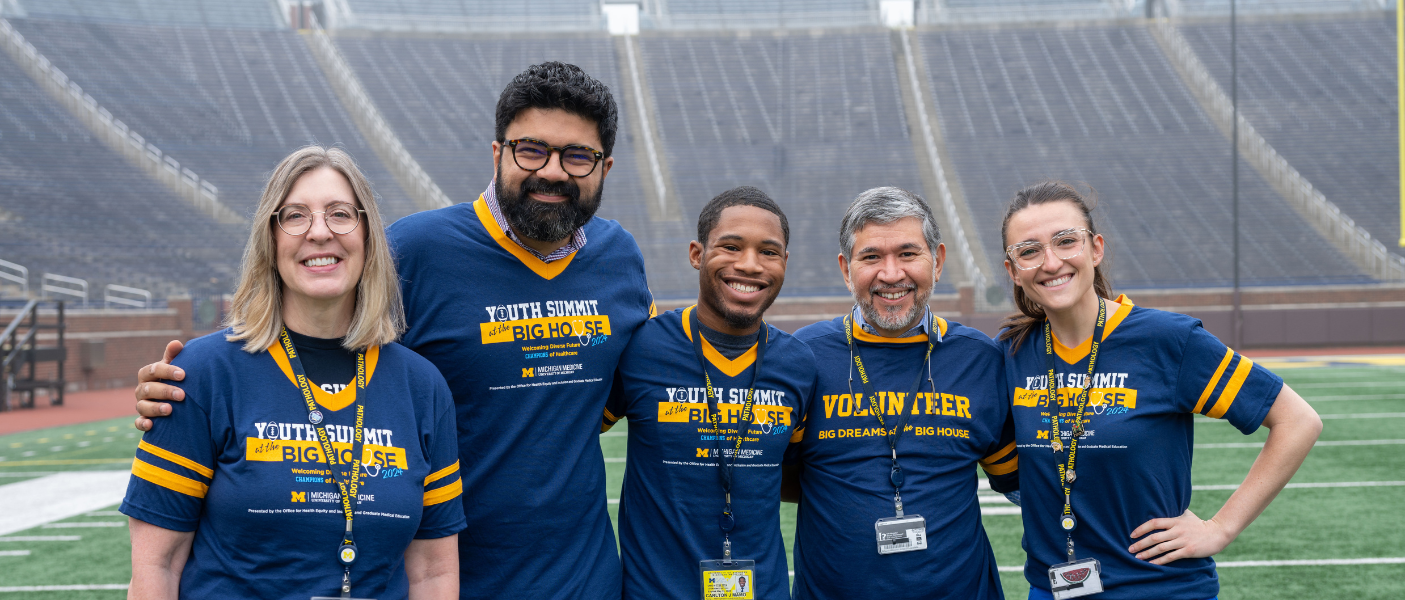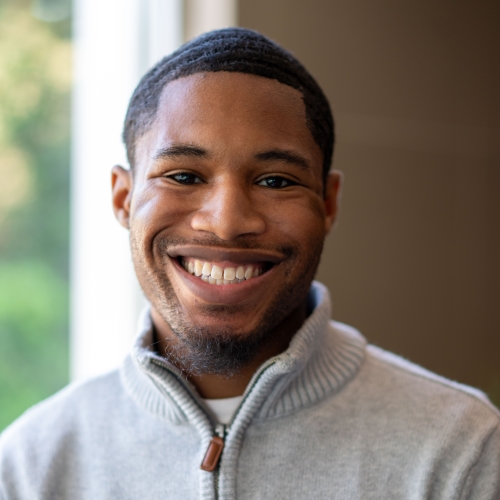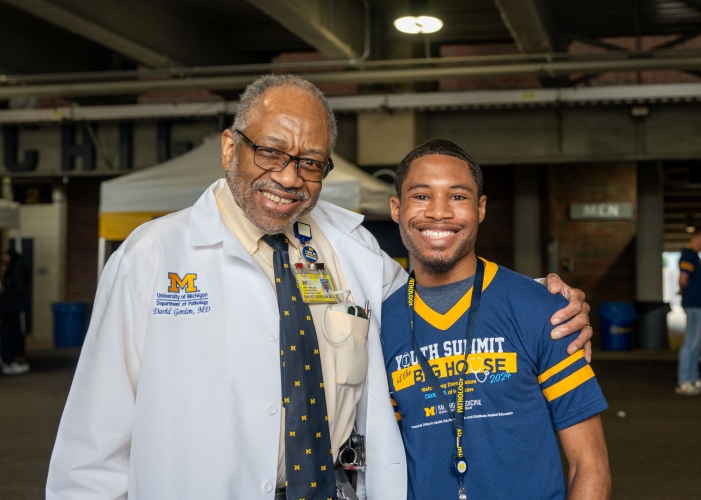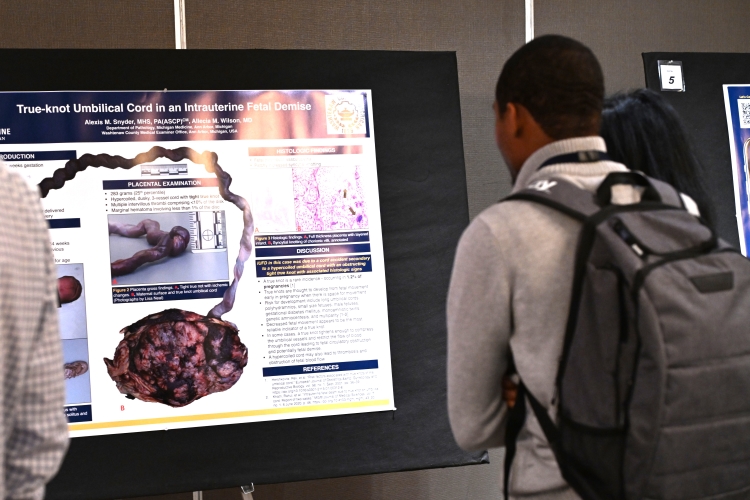

The Department of Pathology is pleased to welcome Carlton Mamo as an Administrative Intern from the University of Michigan School of Public Health. Carlton is a student in the Health Services Administration graduate program. Recently, we sat down with Carlton to get to know him a little better.
 Carlton, please share with us a little about your background.
Carlton, please share with us a little about your background.
I was born and raised in Redford Township, a suburb of Detroit. As one of eight siblings in an adoptive family, my upbringing was filled with a dynamic mix of personalities and experiences. My passion for the visual and performing arts was really evident early on—I participated in various bands playing tenor saxophone and a member of the drumline, including Jazz, Concert, and Marching Band through the South Redford School District, all while honing my skills in drawing and painting.
For my higher education, I spent my time at Michigan State University, where I pursued a degree in Interdisciplinary Studies from the College of Social Science. This program provided me with knowledge from diverse social science disciplines such as anthropology, criminal justice, economics, geography, history, political science, psychology, and sociology. It was through this interdisciplinary approach that I gained a deep understanding of how population health is influenced by social, behavioral, and economic factors.
Many of my leadership roles and responsibilities have centered around building community and fostering inclusive environments. Serving in roles like resident assistant and service center representative during my undergraduate years was particularly rewarding because it enabled me to offer resources to my peers and actively engage with students. Navigating college as a first-generation college student comes with distinct challenges, which have also created significant learning experiences and opportunities. Sharing these resources and insights with others has been a particularly fulfilling aspect of my journey.
Witnessing the social determinants of health within my community, I didn't fully grasp their significance at the time. It wasn't until my later high school and collegiate years that I began to contextualize these complex issues, finding power in understanding them from a systematic perspective. This insight fueled my desire to delve deeper into the operations of hospitals and healthcare organizations, as well as the policies influencing their decision-making processes.
My minor in Leadership of Organizations in the School of Human Resources and Labor Relations was particularly helpful, educating me on organizational culture and the attitudes that drive leadership. I appreciated how this program prepared me and my classmates to assess the effectiveness of leaders across various types of organizations, including business, government, and non-profit sectors.
Through my current studies, I've recognized that health administration is complex emphasizing many of the leadership qualities I have learned in my coursework. Developing key leadership competencies such as cultural awareness and emotional intelligence has become super beneficial to my personal growth, and I view them as critical to anyone aspiring to lead effectively within the healthcare sector.
What are you studying at the School of Public Health?
I am currently pursuing a Master of Health Services Administration degree at the University of Michigan’s School of Public Health, within their Health Management and Policy program. Having completed my first year, I have enrolled in many courses that have contributed to my academic and professional growth, a few being Healthcare Financial Accounting, Healthcare quality, performance measurement and improvement, Economics of Healthcare, Organization and management of healthcare systems, as well as a class specifically focused on Professional Development.
Because of this program I feel well-prepared to take on leadership roles and pursue a career in healthcare. The program has been exceptional, providing my classmates and I with the skills and knowledge necessary to navigate the rapidly changing healthcare industry—addressing challenges such as the rise of artificial intelligence, the increasing demand for at-home healthcare delivery, and the ongoing shift toward value-based care models.
You are currently serving as an intern. Please tell us more about your internship.
In my current role, I am collaborating closely with my preceptors in the Chief Operating Office, Scott Marquette (Associate Chief Operations Officer), and in the Department of Pathology with Brooklyn Khoury (Chief Departmental Administrator). My decision to join the MHSA program was fueled by a huge interest in discovering the intricacies of hospital operations, engaging with department leaders, and prioritizing the delivery of outstanding patient care. The opportunity to apply my newly acquired knowledge in such a tangible and impactful way, at an institution I admire has been so motivating!
The initial weeks of my internship at Michigan Medicine have already been remarkable. The sense of excitement and inspiration grows as I delve further into the work with the Pathology Department. Both Scott and Brooklyn have been extraordinary mentors, fostering a welcoming environment and involving me in the day-to-day life of healthcare administration. So far, I am gaining invaluable exposure to leadership, participating in significant projects with senior management, and taking part in meet and greets with key hospital leaders.
 Some highlights of my internship experience include:
Some highlights of my internship experience include:
You recently attended our Advances in Forensic Pathology conference. What were your impressions of the conference?
The forensic conference was a new experience for me, and it was insightful to see the critical roles pathologists and medical examiners play in conducting autopsies and issuing death certificates.
 I particularly enjoyed a session on the Opioid Fatality Review. I learned the first recorded fentanyl-related fatality occurred in January 2010, with a total of four deaths that year. By 2022, fentanyl was involved in 57% of overdose deaths. During the conference, we learned about the Michigan Overdose Fatality Review Program. This program brings together multidisciplinary teams consisting of experts in various fields who provide insights into the lives of individuals who have passed away and analyze data. Their goal is to develop recommendations to prevent future overdoses. A key insight from this initiative is the importance of ongoing data tracking and applying suggested improvements. Regular updates and maintaining responsibility within team meetings and oversight committees are vital components of this public health initiative. The conference's insights complimented my previous Narcan training with the Public Health Action Support Team (PHAST), where I learned the practical use of Narcan spray as an opioid antagonist to counteract overdoses. These discussions have clarified the importance of recognizing the growing presence of synthetic opioids in our society.
I particularly enjoyed a session on the Opioid Fatality Review. I learned the first recorded fentanyl-related fatality occurred in January 2010, with a total of four deaths that year. By 2022, fentanyl was involved in 57% of overdose deaths. During the conference, we learned about the Michigan Overdose Fatality Review Program. This program brings together multidisciplinary teams consisting of experts in various fields who provide insights into the lives of individuals who have passed away and analyze data. Their goal is to develop recommendations to prevent future overdoses. A key insight from this initiative is the importance of ongoing data tracking and applying suggested improvements. Regular updates and maintaining responsibility within team meetings and oversight committees are vital components of this public health initiative. The conference's insights complimented my previous Narcan training with the Public Health Action Support Team (PHAST), where I learned the practical use of Narcan spray as an opioid antagonist to counteract overdoses. These discussions have clarified the importance of recognizing the growing presence of synthetic opioids in our society.
What do you hope to learn this summer?
With the unique privilege of working between the Chief Operating Office and the Department of Pathology, I anticipate an immersive experience that will provide me with a comprehensive view of the UM health system from both an operational and ancillary services perspective. I am excited about diving into the administration behind core patient support areas such as food and nutrition services, safety management, parking and transportation, environmental services, as well as facilities management.
Alongside these operational insights, my time with the Department of Pathology, an integral service line within operations and ancillary services, presents an amazing opportunity to understand the far-reaching influence of pathology on every aspect of healthcare. I look forward to learning about its vital role in the patient care continuum, from accurate diagnoses to crafting targeted treatment plans.
What are your career goals?
My career goal is to impact health inequities and to collaboratively contribute to the provision of more equitable care for patients seeking healthcare services. I aim to gain a deeper understanding of how to manage medical facilities and comprehend the operations behind the healthcare system. With the healthcare system in the United States constantly expanding and undergoing changes, it is vital that we strive to improve our system to ensure access to quality care for everyone. The prospect of effecting change within the various careers that health administration offers excites me, and my desire to learn in this specialized field has never been stronger.
Are there any fun facts about you that you are willing to share?
My passion for travel has deepened significantly. I have recently enjoyed international experiences in Italy and Grenada. In Rome, Italy, I spent two summers as both a participant and program assistant for the Michigan State University Arts, Culture, and Sustainability program, led by Dr. Igor Vojnovic. This exceptional experience taught me how urban growth and change affect lives economically and socially. We addressed topics including income inequality, demographic trends, and global environmental issues. The program delved into the effects of globalization on urban growth and division, highlighting sustainable development's critical role.
On my latest trip to Grenada, I collaborated with the School of Public Health's Public Health Action Support Team (PHAST). Together with my team, I worked alongside Grenada's Ministry of Social Development and Gender Affairs to contribute to establishing a Disabilities Affairs Unit for the Government of Grenada. Our goal was to provide the Ministry with well-founded recommendations for implementing this unit. We conducted interviews and hosted focus groups with individuals across four parishes, including caregivers, to gain insight into the lives of people with disabilities.
These experiences are precious to me, as they not only offer the chance to meet new people but also to immerse myself in diverse cultures and create partnerships that are beneficial for all when engaging in community work. These joint efforts ensure we address the community's specific needs and foster cooperative relationships that honor and elevate the community's voice and views.
Thank you, Carlton, for sharing your life with us. We are delighted to have you on the team! If you see Carlton around the department, please be sure to greet him and introduce yourself.